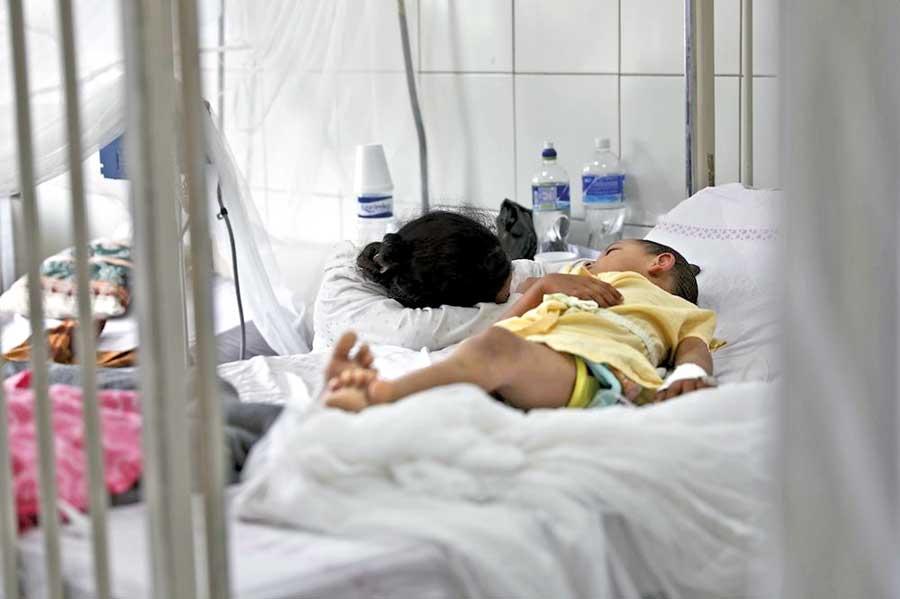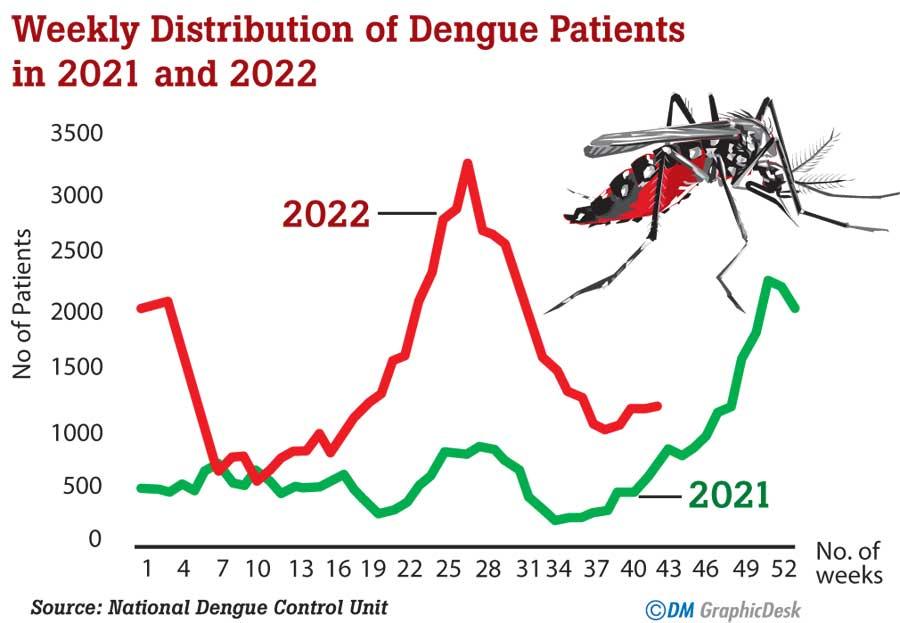21 Oct 2022 - {{hitsCtrl.values.hits}}

Sri Lanka is on the verge of a catastrophic dengue outbreak, The unavailability of dengue testing kits, according to medical trade unions and doctors, is a major impediment
Sri Lanka is on the brink of a major dengue catastrophe with a projected three-fold rise in cases from the first week of November once the rain ceases. Compounding the anti- dengue efforts currently underway, medical trade unions and doctors cite the lack of dengue testing kits as a serious obstacle to identifying more patients before they develop serious symptoms. The Daily Mirror learned that there is a tug-of-war between various factions on procuring these kits via the Indian Credit Line and from other sources, probably at a higher cost. The delay in sourcing these kits could, however, be costly for patients in more ways than one.
dengue efforts currently underway, medical trade unions and doctors cite the lack of dengue testing kits as a serious obstacle to identifying more patients before they develop serious symptoms. The Daily Mirror learned that there is a tug-of-war between various factions on procuring these kits via the Indian Credit Line and from other sources, probably at a higher cost. The delay in sourcing these kits could, however, be costly for patients in more ways than one.
Sri Lanka has recorded over 59 300 dengue cases so far in 2022. According to the Ministry of Health, a total of 59,317 dengue patients were reported, and a majority of the cases, which is 14,383 were reported from the Colombo District. Gampaha district recorded the second-highest number of dengue patients at 9606 cases, while Kalutara
District recorded 5336 cases.
National Dengue Control Unit Director Dr.Sudath Samaraweera underscored a 2.3% increase in Dengue cases compared to the previous week’s statistics.
Daily Mirror queried Dr. Sudath Samaraweera regarding Dengue Control Week and the progress regarding the Programmes conducted by the National Dengue Control Unit; however, he was unwilling to respond on these matters.
In this context, The Association of Health Professionals President Ravi Kumudesh revealed that currently, the National health system does not have any dengue kits, and if the Health Ministry does not take any action in this regard, the situation will be the same for six months. “I say with responsibility that the Medical Supplies Division does not have any dengue kits, and the State Pharmaceuticals Corporation (SPC) too has not taken any action in this regard. A procurement request has been sent to the Indian High Commission, but none of the officials are following up on the process,” said Kumudesh.
If we do not follow the system that comes along with the Indian Credit Line, we will not be able to continue with the current system. Several consultants want to stop us from buying from the Indian credit line, but if we stop it, we will face a mammoth drug shortage - Ravi Kumudesh President Association of Health Professionals
Kumudesh added that purchasing drugs via the Indian Credit Line is an extremely complex process. “We sent a procurement request one and a half months ago. Now the Treasury has sent it to the Indian High Commission, but the process is not followed up by our side. The Indian High Commission should then communicate with the SPC. And from the SPC again, it should go to the Ministry. If this is followed up properly from our side, we can purchase dengue kits in two weeks. Anyhow as the Ministry of Health and the Laboratory Division are not expediting the process we will not be able to purchase dengue kits for at least six months,” Kumudesh said.
In addition, Kumudesh said that although the Medical Supplies Division has made a request and the SPC has sent the request to the relevant authorities to purchase drugs, test kits, and laboratory equipment, there is a tug-of-war between buying from the Indian Credit Line and purchasing drugs from different buyers. “What we, the association of Health professionals, suggest is that buying from the Indian Credit line is the most cost-effective method currently available to us. And most importantly, and we are experiencing the first phase of it these days,” Kumdesh underscored.
Furthermore, Kumudesh explained that the Dengue epidemic has increased up to three times when compared to last year. “The increase of dengue patients is three fold. With the current monsoon rains, we expect the situation to worsen and the number of patients to increase further by three fold. If this situation continues, we will not be able to conduct a full blood count test at a hospital. Identifying dengue early makes it possible to treat the patients without admitting them to the hospitals” said Kumudesh. But he underscored that if we find ourselves in a position where we cannot even conduct a full blood count and treat them early, then we would face
grave consequences.
Kumudesh said that considering all these factors, we are experiencing a risky situation, but the SPC, MSD, and the Ministry are in a tug of war due to their whims and fancies. “Four billion are to be paid to several companies we have purchased drugs from, so these companies will not give us further assistance. The health officials do not like to alter current systems due to their Commissions and other connections,” he said. He expressed his concern and said that an entire nation is at risk because of individual gains.
Moreover, Kumudesh said that the Health Minister or the government does not have the knowledge to change the current corrupt system and does not make an effort to do so. “They are just looking at what is happening, which leads to building a health crisis. The National Dengue control unit is maintain that dengue is on the rise, but the government is depriving the people’s needs, wants, and facilities,” he complained.
Usually, we see a surge of cases in December and January. Currently, it is manageable, and we are conducting household inspections. Nearly 4000 households were subjected to inspections, and around 4 % were found with mosquito breeding grounds - Dr. Ruwan Wijayamuni, Chief Medical Officer of Health, Colombo Municipal
“We are spending more than what is needed for some laboratory test kits and equipment. What we purchase as “branded” products is four times more costly than what we can purchase from India. But finally, when we consider the utility, quality and benefits the patients get, there is nothing magical in bringing benefits to people when we buy outside the Indian system. We just blabber about the quality and unnecessarily burden ourselves paying high prices. We must purchase medicines and equipment of quality, but at low cost. We should adapt to the Indian system; but it does not mean that we have to be an Indian Colony. If Germany or France gives us a credit line, then there is no issue, but currently, only India has given us a helping hand, so we must adapt to that system. The reason that we cannot adapt to that system is that the people who are taking advantage of the current system do not allow that. There are different colleges that manipulate the SPC, NMRA, and the Health Ministry. Regardless of the country where drugs and laboratory equipment are imported from, a sustainability test is done. Thus, samples are sent to colleges for sample checking. Anyhow, the end result of these colleges does not come with a technical know-how background; their decisions and recommendations are based on their choice. That is why there is an issue, especially in the laboratory division; we pay at least three times for reagent kits, which is absolutely unnecessary,” he explained.
Dr. Ruwan Wijayamuni, Chief Medical Officer of Health, Colombo Municipal Council, speaking to Daily Mirror, said that a surge of dengue cases is expected in the first weeks of November once the rain stops. “Usually, we see a surge of cases in December and January. Currently, it is manageable, and we are conducting household inspections. Nearly 4000 households were subjected to inspections, and around 4 % were found with mosquito breeding grounds. Mosquito fogging is done early morning and in the evening as well,”
Wijayamuni said.
In addition, areas like Kirulopone, Narehenpita, Nawala, Pamankada, Wanathamulla, and Borella south have been identified as hyper-risk areas, and special attention will be paid to
those areas.
Moreover, the Health Ministry has flagged 31 MOH areas as high-risk areas during the past week. Out of the 31 flagged high-risk areas, eight MOH areas have shown a rising number of cases this week.
National Dengue Control Unit will conduct a three-day special mosquito control campaign in 60 high-risk MOH areas in 11 districts. In addition the NDCU will be conducting training on the clinical management of dengue for Medical Officers and Nursing Officers at the National Institute of Infectious Diseases.

25 Nov 2024 2 hours ago
25 Nov 2024 2 hours ago
25 Nov 2024 2 hours ago
25 Nov 2024 3 hours ago
25 Nov 2024 4 hours ago